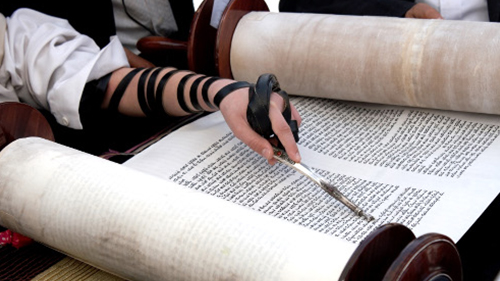We don’t often turn to the Torah for a lesson in economics, but this week’s portion Parashat Behar is the basis for a number of teachings related to the basic economic issues of supply and demand, and the special conditions that apply to the sale of real estate.
The structure of the World Union for Progressive Judaism is a response to our recognition that as Jews, we share a common destiny and should be conscious of our responsibility to care for one another. If one of us in trouble, we must all join together to repair the hole.
No portion in our Torah discuss Judaism on a planetary scale more clearly than Behar-Bechukotai. The commandment of the sabbatical year makes clear that all the earth, not just that of the Land of Israel, belongs to God and is only on loan to us.
This week’s Haftorah tells the amazing story of when the Babylonian army is about to destroy Jerusalem, it looks like the people are about to be exiled; and Jeremiah’s cousin, Hanamel, asks the prophet to redeem his portion of land in the Jerusalem suburb of Anatot. Real-estate is plummeting but Hanamel acts on one of the most important Jewish values: understanding that ”it’s not over until it’s over and even then…. it isn’t over.”
One of the most frequently quoted Biblical texts, especially beloved to Americans going all the way back to the period of their independence as a nation, is the phrase: “And you shall proclaim liberty throughout the land”. These formidable words were inscribed on the Liberty Bell, that icon of American history, which was hung in Philadelphia’s Assembly Hall on March 10, 1753. Yet, how many of us, Jew and Gentile alike, can actually tell you the biblical source for that quotation?
Recent Issues By: Rabbi Micah Streiffer , Rabbi of Temple Kol Ami , Thornhill, Ontario, Canada Sacred Moments The old joke says that every Jewish holiday can be summed up in three short sentences: They tried to destroy us. They failed. Let’s eat. It’s not true, of course. Our festivals are incredibly nuanced and rich […]
Our Sidra begins (Leviticus 21:1-4) with God telling Moses to tell the priests not to touch a corpse, unless it is of someone in a close family relationship to them – including ‘your brother’. To be fair, God does not talk to Aharon directly at this point; this is just after two of his sons, Nadav and Avihu have been burned up whilst in the performance, it seems, of some unspecified and unscheduled ritual actions (Leviticus 10:2). Everyone is in shock – Aharon, his surviving sons Eleazar and Itamar, Moses who has lost two nephews, and anyone in the Camp who heard of what had occurred and who now has evidence, if this were needed, that when things go wrong they can go very wrong indeed. Exact details are not given, cannot be given, for there are no surviving eye-witnesses; the accident seems to have happened by itself, the fire springs up out of control, leaving God just as shocked.
Recent Issues by Rabbi Matt Cutler, Congregation Gates of Heaven , Schenectady NY I was listening to some kids practicing reading Hebrew. One child made a very interesting mistake. Instead of reading HALLEL, he read the word CHALLEL. He inadvertently made the Hebrew letter HAY a CHET. Simple mistake right? But it made me think […]
Connection to Reality By Rabbi Grisha Abramovich, Belarus Our Torah portion this week addresses issues that may not necessarily appear to be connected at first glance. Right after the laws concerning priests, we read about the calendar of our sacred occasions: Shabbat and festivals. Then, at the end of the chapter we are told the […]
The congregation where I grew up was the oldest congregation in the State of Illinois – yet steeped in 1960’s style social justice activism. I learned then that commandments to help the poor and the stranger were expressive of Judaism’s age-old, unchanging commitment to the most vulnerable members of society.

